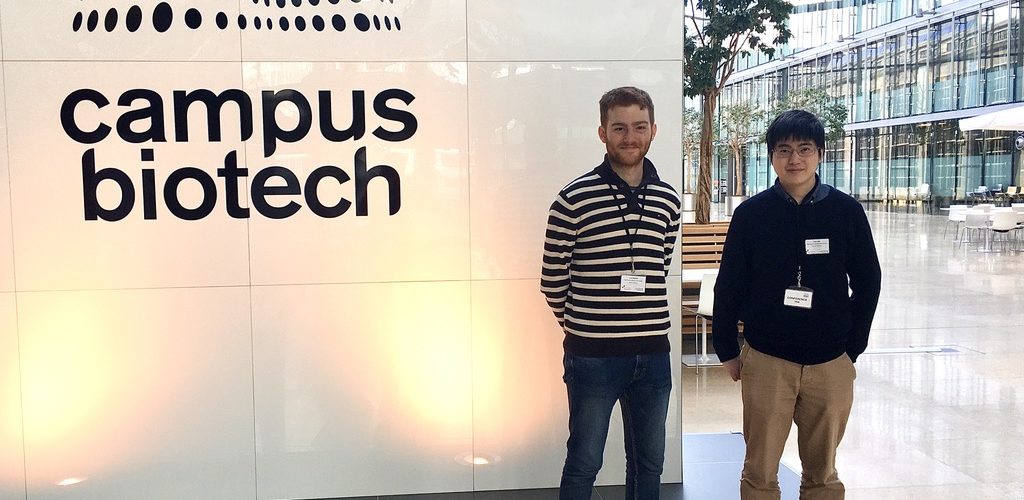Synapsy model imitated worldwide
19 August 2020

The translational graduate program at the International Max-Planck Research School for Translational Psychiatry – which is similar to Synapsy’s – is used to teach physicians and researchers. Two PhD students tell us about their approach and training.
Synapsy researchers and clinicians joined forces in 2010 to study the biological basis of mental illnesses with the aim of improving diagnosis and treatment. One of the goals of this innovative combination of neuroscience and psychiatry is to train a new generation of psychiatrists who are fluent in neuroscience. It is an approach to training that has proved successful, and has inspired Munich’s highly-reputable Max-Planck Institute with its international school. The International Max-Planck Research School for Translational Psychiatry (IMPRS-TP), created in 2016, is a doctoral studies program that provides an interdisciplinary training in molecular, cellular and systemic psychiatric research. The program offers its 50 or so current students a wide range of courses, including molecular medicine, neuroscience, psychiatry, neuroimaging and stereology, not to mention clinical studies. In addition, the IMPRS-TP runs an integrated doctorate / residency program in psychiatry for physicians.
By focusing on the translational, doctoral students receive an overview of the clinical aspects of illness, and young physicians gain research expertise while developing their clinical skills. A delegation of students was present in Geneva at Synapsy’s last Neurobiology of Mental Health conference, which gave us an opportunity to learn all about the training with two of the attendees, Yi-An Liao and Lucas Miranda (see bios on page 3).
Synapsy: The profile of students is also a source of wealth for a school. What is the situation regarding psychiatry in your home countries?
Yi-An Liao: Psychiatry in Taiwan is heavily geared towards biology, because we don’t have a Freudian or Lacanian tradition. Technology already has a solid presence.
Lucas Miranda: In Argentina – without generalizing, and given that I’m not even a psychiatrist myself – I think the approach is quite traditional and still focuses on psychotherapy and patient care, especially at the University of Buenos Aires, which is the country’s largest university.
Synapsy: Why did you choose translational psychiatry as your respective careers?
Yi-An Liao: I chose psychiatry because it’s the least understood branch of medicine. It’s the only field where there aren’t any biomarkers yet for diagnosing patients: clinical examination is based exclusively on symptomatic criteria. It’s fascinating! There’s still so much to explore, unlike in other areas of medicine. And, since I’ve always been interested in how the brain works, psychiatry was the best option for satisfying my curiosity.
Lucas Miranda: Coming from genetics and computer science, I’m pretty new to neuroscience. I was attracted by the same things as Yi-An, namely that there is still so much to discover and huge amounts of data to analyze. What’s more, the prevalence of psychiatric disorders is higher than people think. I like to feel useful to a lot of people by helping research and knowledge progress.
Synapsy: What is the IMPRS-TP approach?
Yi-An Liao: The program tries to narrow the gap between clinical work and basic science. The idea behind translational psychiatry is to be in a position to apply the outcomes of basic research to clinical work. The IMPRS-TP program has a strand for physicians like me: we’re sent away for several years of basic research and then come back to practice at the hospital at the Max-Planck Institute for Psychiatry. The idea is that physicians should be exposed to science so they can develop their understanding of mental illness.
In parallel, scientists and psychologists are given courses on the clinical aspects of psychiatry. The students are invited to attend interviews between psychiatrists and patients in an amphitheater. It’s a two-way program, from basic science to clinic practice and vice-versa.
Lucas Miranda: The fact that it’s two-way isn’t just about applying fundamental knowledge to clinical work, but also about using clinical data in basic research to further our understanding of mental illness and help diagnose or develop new treatments.
Synapsy: Yi-An, as a future psychiatrist, would you say that fundamental knowledge is really helpful for your work as a clinician?
It’s entirely possible to practice without knowing the research, but it does help raise your awareness about the latest discoveries and the new tools that are available. Knowing the literature means we follow established protocols to a lesser degree. As a result, we’re more able to discover something new because we know something’s in the air. In a nutshell, we are more flexible. What’s more, we have a wide range of treatment techniques in psychiatry: psychotherapy, transcranial electrical stimulation and various drugs. These treatments must be given with full awareness of the implications, and being involved in research – particularly clinical research – means you can better recognize the differences between patient sub-groups and so treat them more appropriately.
Synapsy: Lucas, you’re on the side of basic research: does the rapprochement with clinical practice help you in your research?
Yes, definitely, because my job is exactly about using and analyzing data that comes from patients. On the other hand, the clinical aspects covered by the IMPRS-TP training give us greater insight into our studies. It’s really an opportunity to be able to “interact” with patients. Even indirectly, it’s humanist and inspiring, and it feeds into our research. ●
